A Talk with Amal El-Mohtar
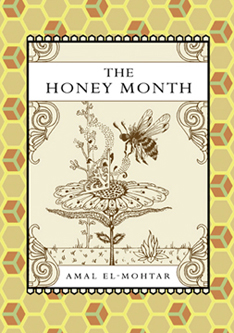 When you taste honey, do you think of ravenfolk, the wicked and the lovely? Do you find sex, death and trickery on your tongue? Ms. Amal El-Mohtar does. Amal was given 28 vials of honey. She tasted one vial per day over the course of one month and wrote down her impressions – some days in prose, others in poetry. These writings have been published as The Honey Month.
When you taste honey, do you think of ravenfolk, the wicked and the lovely? Do you find sex, death and trickery on your tongue? Ms. Amal El-Mohtar does. Amal was given 28 vials of honey. She tasted one vial per day over the course of one month and wrote down her impressions – some days in prose, others in poetry. These writings have been published as The Honey Month.
Seriously, you should buy the book for “Day 27: Leatherwood Honey” alone. It made me gasp. Never mind “Day 11: Blackberry Honey” wherein the universe reminded me what it’s like to have a poem bust open a heart ventricle and fill it with breath-catching melancholy.
Black Gate found Amal wandering in our godswood. We yelled, “HALT, TRESPASSER!” not knowing who she was. As we ran at her ready to tackle, she pulled an ancient blade from behind her back and, well, hmm, embarrassing though it be, we were unarmed. As it’s our swindling nature to distract folks with words we sat down and began to ask her questions. Ms. El-Mohtar very kindly answered these instead of chopping off our heads and we forgave her for trespassing in our godswood.
Here is our chat with Amal El-Mohtar:
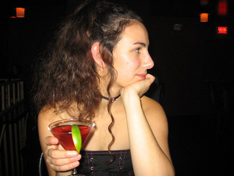
Black Gate: Do you think poetry is as important today as it was in the ages of Milton, Keats or even Ginsberg?
AMAL EL-MOHTAR: I think it depends on where you are and what’s going on. I was raised with the understanding that poetry was a Big Deal, and that To Be a Poet was a huge deal. To Be a Poet was to speak for your generation, your nation, your historical moment, to raise your voice above empty noise or enforced silence and speak what couldn’t otherwise be spoken. But my parents grew up in the context of civil war and unrest in Lebanon, and my grand-father spoke poetry while imprisoned for his politics, so my perspective is informed by their experience.
It’s very interesting to me that the most common reaction I see people having to poetry is one of recoil, one of I don’t understand. I wonder, sometimes, if that lack of understanding comes from not needing to understand – from not having anything in one’s life that yearns and longs for articulation in a way that prose can’t quite satisfy.
BG: Do you think that the value that was placed on poets and writers has shifted to other artistic cultures or dried up completely?
AE: I don’t like to think of things ever drying up completely, unless we’re talking about the evaporation necessary before precipitation. So let’s say shifted – phase-shifted, even. Also I’m suspicious of any “it was so much better back then” rhetoric; I might think of the early nineteenth century as a time when literature really mattered, or when a writer could make a significant wage from their work, but how many people could read, then, versus now? Who was placing that cultural value, and deciding what culture was? I don’t know – but I’d rather not assume that things have gone downhill, I suppose.
BG: Who are three dead poets you’d have everyone know?
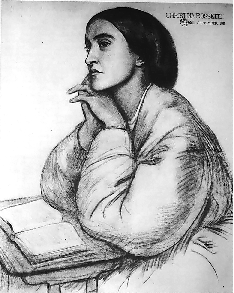
AE: Oh, just three! Augh! And there are so many dead poets I have yet to know as well as I should, like Edna St. Vincent-Millay, whom I can’t believe I’m only just developing an acquaintance with! Keats, Rossetti, H.D., off the top of my head, because theirs are poems I sing, but you’ve gone and made me leave out Shakespeare and Yeats only on the basis that everyone probably DOES know them, but then that could go for my mentioned three as well, so maybe I ought to think of obscure poets, but then I won’t stop, and anyway if everyone knew all the poets I loved I wouldn’t be able to introduce them to anyone, so I think I’ll leave it at that.
BG: What about three living poets folks should know?
AE: Catherynne M. Valente, Lisel Mueller, Sonya Taaffe, though again, the list could and should go on and on and on. Robin Robertson! David O’Meara! JoSelle Vanderhooft! Ach.
BG: The Honey Month isn’t a book of poetry and it isn’t a book of prose, what is it? Where would you want it found in a library or bookstore?
AE: I think I’d love it to be shelved in Fantasy. That’s what it is, more than anything else, I think – though I daresay readers of poetry tend to be more forgiving of prose in their books than vice versa, so perhaps it should be in poetry. But in my ideal imagined world, someone would see it in the Fantasy section with a hand-written shelf-talker beneath it proclaiming it to be delicious, and home it would go with a curious bystander who’s always kind of liked honey and has been dazzled by Oliver Hunter’s art, and who then, after reading it, thinks “well, if that’s poetry, that wasn’t so bad,” and start attending local readings and open up to a shiny new art form.
BG: With all the free form writing going on, when does a piece stop being a poem and become prose?
AE: This is how I think of it: the difference between poetry and prose is the difference between singing and speaking. You are using a different part of your brain. You are performing a different action, though you are using the same physical muscles.
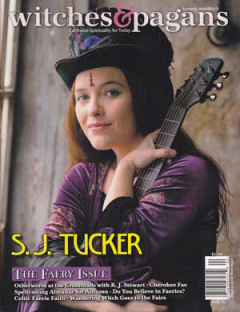
BG: Were you to put music to The Honey Month, who do you think the ideal musician(s) would be?
AE: Oh, what a beautiful thought! I have had one very dear musician friend whose work I adore suggest she’d be interested, so S. J. Tucker is the first to spring to mind – but honestly, I don’t want to think of ideals here so much as of how profoundly grateful I would be to have anyone be inspired enough by my words to make art of their own. I don’t want the limit of the Platonic – I want to hope for a wellspring of songs and tunes from different people, as many flavours of sound as there are flavours of honey, and more.
BG: Does music feature into your writing process?
AE: Absolutely. Characters often have playlists; a given musical mood will seep into a story here or a poem there. Sometimes when I really want to write but nothing’s coming, I put on ache-inducing songs and transcribe the lyrics until something breaks and pours out.
BG: If The Honey Month became an audiobook and you had an unlimited budget, what actor(s) would you want to read it aloud?
AE: Oh wow. Ideally I’d want many different voices, I think, for different pieces – and different accents and cadences. Similarly to the music question, I just feel that the aggregated nature of this project requires something similar in performance. I’d want some pieces sung and some pieces spoken, some pieces acted, perhaps another (Ugandan Honey!) danced… But again, less a matter of big names than of people who’ve loved it and want to make something of it.
BG: Was there a day that was harder to write than others?
AE: There were a few that I had to sit with for a while, and that didn’t come easily, or that I wasn’t quite happy with when they were done. Day 4, Raspberry Rose Honey, I didn’t feel I had quite right by the end of it; Day 13, Black Locust Blossom Honey, came out as a villanelle, and trying to keep the rhymes from jangling awkwardly was tricky; Day 20, Blackberry Honey (2), begins “It’s gone, now” because I sat down with my head swimming with wants and needs and the desire to pour it all out, but then it just vanished, and I had nothing to say except that I had nothing to say. It came ’round to something eventually, but that loss was palpable.
BG: How about giving a shout out to a few of your favorite bookstores and libraries?
AE: 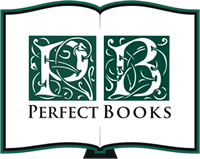 Oh, definitely! My favourite bookstore is hands-down Perfect Books, in Ottawa, Canada, where I worked for five years, and felt I got to be part of a family; also in Ottawa is Collected Works, which has a gorgeous poetry selection, in addition to a non-Starbucks coffee shop and splendid staff and performance space. The Ottawa Public Library (Metcalf branch, represent!) is dear to me, as is the University of Ottawa’s (MORISSETTE!) library, but dearest is the Aylmer Public Library, which is in a new location attached to Aylmer’s City Hall, but previously was in a gorgeous old building which used to be a prison and is almost certainly haunted. That’s where I spent hundreds of childhood hours, and where I first felt any measure of autonomy, being able to bike there by myself whenever I wanted. I also adore the Comic Book Shoppe on Bank Street in Ottawa.
Oh, definitely! My favourite bookstore is hands-down Perfect Books, in Ottawa, Canada, where I worked for five years, and felt I got to be part of a family; also in Ottawa is Collected Works, which has a gorgeous poetry selection, in addition to a non-Starbucks coffee shop and splendid staff and performance space. The Ottawa Public Library (Metcalf branch, represent!) is dear to me, as is the University of Ottawa’s (MORISSETTE!) library, but dearest is the Aylmer Public Library, which is in a new location attached to Aylmer’s City Hall, but previously was in a gorgeous old building which used to be a prison and is almost certainly haunted. That’s where I spent hundreds of childhood hours, and where I first felt any measure of autonomy, being able to bike there by myself whenever I wanted. I also adore the Comic Book Shoppe on Bank Street in Ottawa.
BG: What was the last excellent book you read?
AE: Oh gosh. I’ve got a pile of NO DOUBT excellent books TO read, and am in the middle of Jeff VanderMeer’s Finch, which is awesome so far, but the last excellent thing I read was the last volume of the Scott Pilgrim comics, ‘coz I re-devoured them all over Christmas.
BG: What writing projects do you have in the fire (outside of your PhD work and Goblin Fruit)?
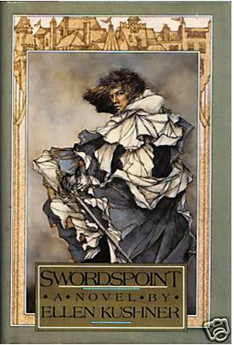 AE: I want to build up more of my Steampunky Damascus, and revisit some of the characters from “To Follow the Waves” — but I also want to revisit the world of “The Green Book,” and wrap my brain around the science required for my sentient-diamond-oceans story. Also I want to finally freakin’ write a novel, but the biggest writing project I currently have on my plate is my PhD thesis (about representations of fairies and other supernatural creatures in Romantic-era British writing), and it gets priority. Still, the World Fantasy Convention is happening in Toronto in 2012, and I would dearly love to have a novel to promote at that point, assuming the world hasn’t ended.
AE: I want to build up more of my Steampunky Damascus, and revisit some of the characters from “To Follow the Waves” — but I also want to revisit the world of “The Green Book,” and wrap my brain around the science required for my sentient-diamond-oceans story. Also I want to finally freakin’ write a novel, but the biggest writing project I currently have on my plate is my PhD thesis (about representations of fairies and other supernatural creatures in Romantic-era British writing), and it gets priority. Still, the World Fantasy Convention is happening in Toronto in 2012, and I would dearly love to have a novel to promote at that point, assuming the world hasn’t ended.
Bonus Round
Fill in the blanks:
On Sunday afternoons I am composing hand-written letters to my best beloveds and on Wednesdays at 3 a.m. I am dreaming of ritualized adventure.
The first time I realized the world epically sucked was while watching a documentary about how we’re destroying the planet, I think. But I can’t remember how old I was. Otherwise it’s when I was seven, and saw a young boy selling gum on the streets of Beirut, and my grand-mother explained to me that he did that to support his baby sister because their parents had been killed in the civil war.
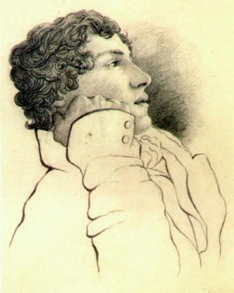
The first time I realized the world was epically beautiful was when I saw just how many stars there were in the sky, far away from city lights.
With one day left in life, I would read some of Tolkien’s The Hobbit, eat acres of my mom’s tabbouli and sing all the songs my sister and I know together.
Were I to duel any character in fictional history, it’d be St. Vier from Ellen Kushner’s Swordspoint, because I would be training with him in the ideal world that exists in my head.
Were I to have sex with any author in history, it’d be Keats, because what’s sexier than being called a Belle Dame Sans Merci? Mmmm. Keats.
Mmmmn. St. Vier. So hot. I will train with him too! And then we shall all have DUELS in the COUNTRYSIDE!
But you know, for all that St. Vier is, in a word, YUMMY, our Campion has that… that brittle razor-edged tongue that one fears and admires so much in Mad Dukes…
Ellen Kushner’s Riversiders aside, PATTY TEMPLETON, WHAT A GREAT INTERVIEW. Congratulations on your first blog!
And… Amalface!!! You give SUCH GOOD INTERVIEWS!!! Your amazing mind goes Zing-zap-KERPLOW! Kills with a single blow to the heart.
Erm. Yes. THANKS!
Er, well, perhaps less ZING-zap than kerrrplooooooowwwwww, considering how freakin’ long it took me to complete. >.> BECAUSE OF HOW AWESOME THE QUESTIONS WERE, not because I am SLOW AT TURNAROUND, oh NO.
I debated duelling Lymond instead (because that was the first duel in fiction I remember DEVOURING EVERY DETAIL OF instead of skimming, after which there was a long drought before I did the same with Swordspoint), but figured I’d rather duel Lymond IN BED, so, er. You know. So it goes.
FRANCIS CRAWFORD OF LYMOND IS MINE!
MINE, I TELL YOU!!!
Or…
Well, I guess you could have him on TUESDAYS!
The idea of sleeping with any author ever… it is rather a strange question. C.S.E. and I were trying to narrow down the field and it kept turning into a giant literary orgy.
Claireface: I’m sure he’s MAN ENOUGH for both of us. Just about. Mayyyybe. So long as we didn’t tag-team him.
Patty: Mmmmph. It’s especially hard because there are people whose WORDS I would sleep with, but not so much THEM, you know? Poets, pah! Such nasty pieces of work, by and large!
I think, since it is the realm of daydream, it’s much more fun to stick with fictional characters anyway!
At least then you can sort of predict their behavior, plot their downfalls, and buy all their favorite foods, without worrying too much about allergies.
And then, with real folks (Keats for example) there’s the question of droplet infection…
[…] that night, my buddy Pattyhawk (she of the mad interviewing skillz) came over and we sat on my bed and watched the iTunes visualizer make trippy patterns for an hour […]
[…] Jessica Wick has been telling me I should read them for ages. And then the most fair and perilous Patty Templeton chimed in. And then my cool co-worker Janelle “I’m totally surviving the Zombie […]
[…] has blogged for us about Saladin Ahmed and Fantasy in the Middle East, and about whom our other own Patty Templeton has blogged, has received a Nebula Award nomination for her short story, “The Green […]
[…] remember thinking The Honey Month partook of interstitiality when Patty Templeton asked me [in a recent interview] where I’d like to see it shelved in a bookstore. That […]